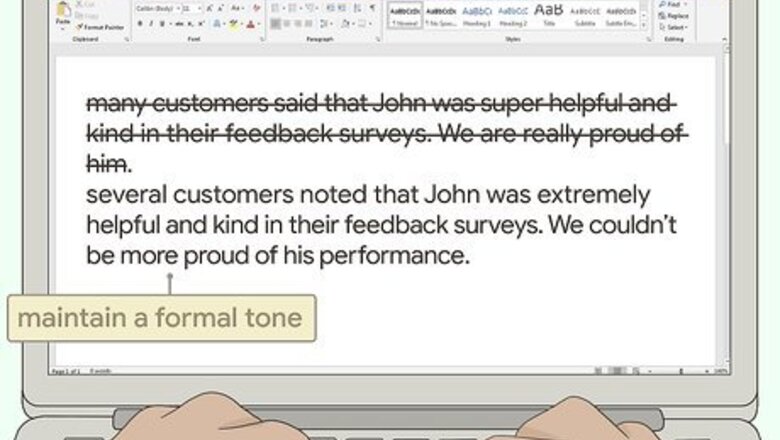
views
Composing a Formal Letter
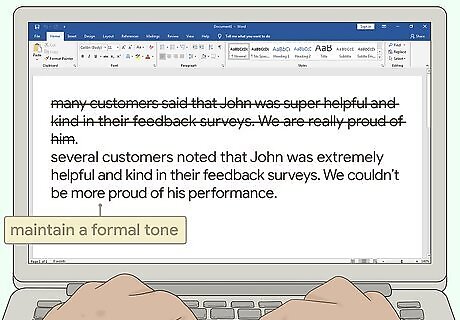
Maintain a formal tone for public letters to employees. Public letters of recognition are typically given as awards for employees or team members that have achieved a certain goal, consistently worked hard, or strived to improve in their role. For a formal letter, opt for a professional tone. Avoid contractions, slang, or unprofessional diction, use a variety of sentence structures, and write in the active voice as often as possible.Tip: You don’t have to be a manager or boss to write a formal letter of recognition. For example, you could write a formal letter of appreciation to a principal about your child’s teacher. Most formal letters of recognition are written to someone you manage, though. If you’re handing your letter over in person or mailing it, write it on company letterhead to make it official.
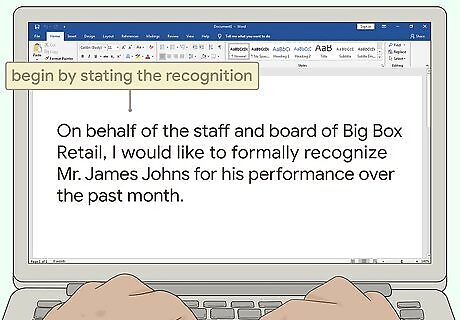
Begin by stating the recognition on behalf of the company. The first sentence of your formal letter should start with an “on behalf of” phrase to indicate that the entire company, staff, or store is indebted to the person that you’re recognizing. Explain why this individual is being recognized. Use their full name and position to make it formal and impactful. Use the pronoun “we” to recognize the individual unless you’re the CEO or owner of the company. Unless you’re recognizing a long-term effort, include the general timeframe of the contribution that led to this letter of recognition. If you’re the owner of a small business, start with, “On behalf of the staff and board of Big Box Retail, I would like to formally recognize Mr. James Johns for his performance over the past month.”
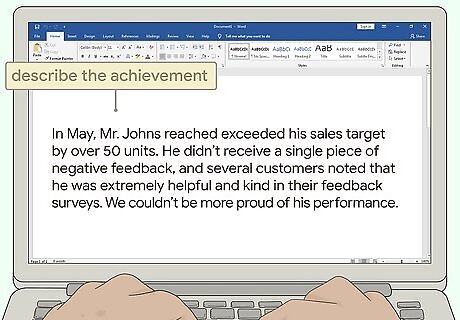
Describe the person’s achievement to highlight their performance. After you’ve written the opening statement, go into more detail about the individual’s performance. Include information about how long and hard the person worked, and be specific about the institution’s satisfaction with their performance. Use the past tense and the pronoun “we” to emphasize the fact that everyone has noticed the individual’s effort. Add 3-5 sentences about the person’s achievement. If you’re the owner of a business, say, “In May, Mr. Johns reached exceeded his sales target by over 50 units. He didn’t receive a single piece of negative feedback, and several customers noted that he was extremely helpful and kind in their feedback surveys. We couldn’t be more proud of his performance.”
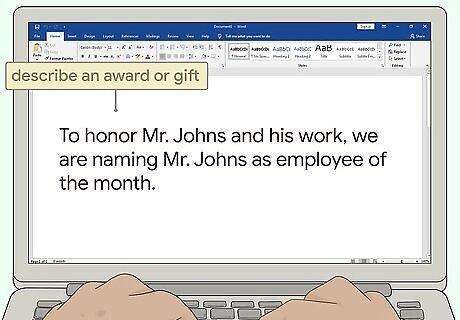
Describe an award, or gift, that the person has earned for their effort. Many formal letters of recognition are coupled with a tangible reward. An extra vacation day, monetary reward, or gift card are all excellent options. You can also choose to give the person some kind of plaque or certificate. Include 1-2 sentences about the reward to make the letter more meaningful. If you’re operating a small business, you may say, “To honor Mr. Johns and his work, we are naming Mr. Johns as employee of the month.”
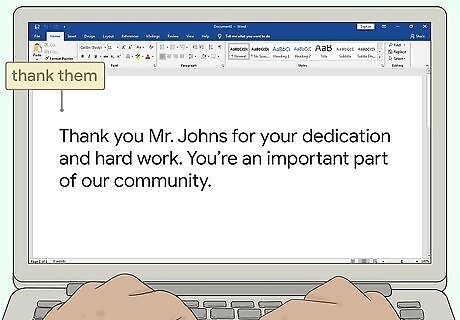
Thank the person for their hard work and contributions. Before you finish your letter, reiterate your appreciation by thanking the person directly. Use simple language and don’t make it too wordy. A simple expression of gratitude will reinforce the point of your letter. Add 1-2 sentences that express your thankfulness. For example, you could say, “Thank you Mr. Johns for your dedication and hard work. You’re an important part of our community.”
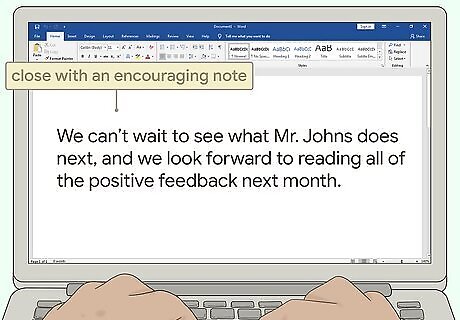
Close with an encouraging note about the future. To end on a positive note of encouragement, express interest and confidence in the employee’s future performance. This will give your letter a smooth chronological progression from past performance to future hope. It will also help to encourage your employee to perform well in the future. Add 1-2 sentences about your interest in the individual’s future. Letters of recognition aren’t sprawling essays. It’s perfectly fine to write a letter that finishes after 6-7 sentences. For example, you may say, “We’re sure that Ms. Smith’s students can’t wait for her next unit, and we’re all confident that her students will be well-prepared for next month’s SAT.” If you’re running a small business, say, “We can’t wait to see what Mr. Johns does next, and we look forward to reading all of the positive feedback next month.”

Present the letter in front of your employees. If you want to recognize a team member or employee that has gone above and beyond the scope of their duty, consider calling a 5-minute meeting and reading the letter out loud in front of your staff. This is the best way to share your recognition, and it will motivate other employees to work hard in the future. If you don’t want to read the letter aloud, feel free to send it in a company-wide email. You do not need to formally present your letter of recognition in front of others, but it’s an effective way to maximize the letter’s impact.
Writing an Informal Note
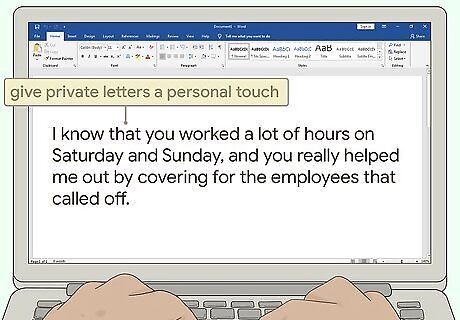
Use a familiar tone to give private letters a personal touch. If you’re writing a letter of recognition and you don’t plan on reading or sharing it in public, use a familiar tone to strengthen the impact of the note. Use the pronoun “I” to highlight your personal appreciation of the individual’s performance. Assume a friendlier tone by using contractions, colloquialisms, and simple sentence structures.Tip: You don’t have to be a manager to give someone an informal recognition letter. You can give an informal letter of recognition to a boss, customer, friend, or coworker. They are certainly an excellent tool for encouraging your employees, though!
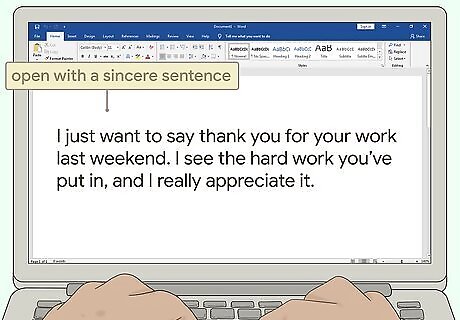
Open your letter with a sincere sentence that says “thank you.” To start, include one sentence that thanks the subject of your letter. Use the first-person pronoun “I” to keep it personal, and include the reason why you’re thanking the person. This is the best way to start your letter on a genuine note. Include 1-2 sentences to recognize the person’s effort. For example, if you’re writing to an employee, say, “I just want to say thank you for your work last weekend. I see the hard work you’ve put in, and I really appreciate it.”
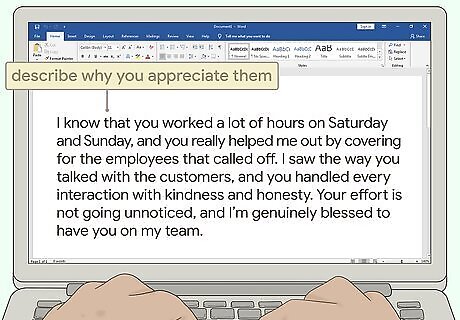
Expand on the reason for the note by describing what you appreciate. After you’ve thanked the person, include a few relevant details that describe why you appreciate them. Highlight something that impacted you directly to make the subject feel good about their performance. Include 2-4 sentences about the subject’s behavior and how it has positively impacted you. Say something like, “I know that you worked a lot of hours on Saturday and Sunday, and you really helped me out by covering for the employees that called off. I saw the way you talked with the customers, and you handled every interaction with kindness and honesty. Your effort is not going unnoticed, and I’m genuinely blessed to have you on my team.”
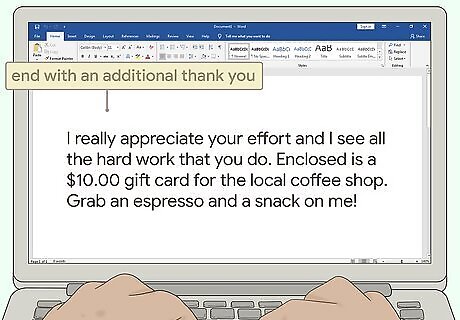
End with an additional thank you and offer a small reward. To close your letter, say “thank you” again to really emphasize your appreciation. This will reinforce the purpose and strength of your letter. If you’d like to take it a step further, include a small reward or offer of compensation. A $10.00 gift card, flowers, or the offer to take the person out to lunch are all excellent tokens of appreciation. Finish with 1-2 sentences to express your gratitude. You do not have to include a gift or offer a reward. This may be inappropriate if you don’t really know the person very well. Informal letters of recognition are typically pretty short. Don’t worry if it feels like your letter is lacking content. The gesture is just as important as the words in your letter. For example, it you’re writing to an employee, say “I really appreciate your effort and I see all the hard work that you do. Enclosed is a $10.00 gift card for the local coffee shop. Grab an espresso and a snack on me!” Handwrite your letter and deliver it in person to really give the letter a personal feel.












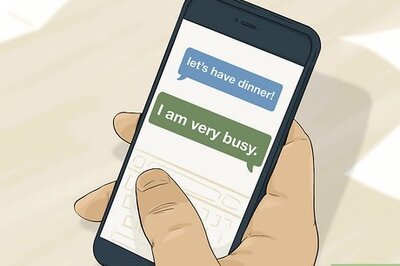






Comments
0 comment